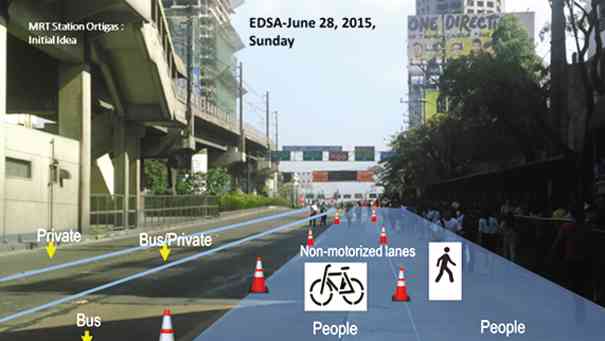
ROAD-SHARING PLAN Places for people to walk, bike, ride public and private transport. “Bayanihan sa daan.”
Why are there traffic jams? Because there are too many motor vehicles. Do ants have traffic jams? No. Why? Because ….
This is called the “principle of the ant.”
More than 80 percent of what clogs the roads are private cars. People buy cars because public transportation is unreliable, inefficient, inconvenient and even dangerous.
So government builds more roads for more motor vehicles, resulting in more traffic jams. It is like fighting fire by pouring gasoline.
1 Ant walk (A)
Short-term: Priority mind shift
It starts with a mind shift: Instead of giving priority to private motor vehicles, let’s focus on improving public transportation with the existing assets. After all, roads are meant to move people. How? The approach below can be done within 60 days.
Cooperate with public transportation operators and drivers.
Following the principle of the ant, public and private motor vehicles must move single file along their own lanes. This is the Filipino spirit of bayanihan in action: bayan—community and cooperation; bayani—hero; bayanihan—cooperative heroism.
2 ‘Alas-puno’ (A)
Let’s begin with the alas-puno (full-o’clock) system.
Buses and jeepneys must leave loading bays only when full. They will then move single file along their lanes to the next loading bays. They will not chase one another competing for passengers because they are full (puno).
The share-a-road exercise on June 28 on Edsa proves that bus operators and drivers will cooperate in the spirit of enlightened self-interest. With a full load all the time, they will earn more.
This little tweak of the system—with public utility vehicles stopping only in their loading bays—also results in passenger discipline.
With a much-improved and quickly implemented public transportation system, most car owners will leave their cars at home.
3 Sidewalks (S)
Instead of narrow (or nonexistent) sidewalks, can we not expand them to at least 5 meters wide?
With safe, comfortable and convenient walkways, people will walk. For good health, every adult must walk at least 10,000 steps a day (about 5 kilometers), or bike about 20 km.
Why do people walk in Singapore, in Hong Kong or in the central business districts of Makati and Bonifacio Global City? Because they have wide sidewalks.
There are billions of pesos ready from the 7.5-percent clean air fund of the road user’s fees. Taking out poison-discharging engines from the roads and giving people good walkways, bike lanes and edible gardens are some of the brilliant uses of that fund.
By the way, this is not a suggestion. It is a law (Sections 9 and 12, Executive Order No. 774 of 2008). But then, maybe in the Philippines, laws are only hints. There is already a living example of the principle of road sharing in the UP Academic Oval. Calling the Department of Budget and Management.
In the short term, sidewalks must be cleared of all temporary and permanent obstructions. Sidewalk vendors can be relocated to a nice talipapa (flea-market) area. Illegally parked vehicles must be removed and hard-headed violators can be sued. No ifs, no buts, no-nonsense.
Bike ways
Take out one lane from the road and reserve it for a bike lane. A bill in the House of Representatives (House Bill No. 5810), which seeks to put up bike lanes in all primary and secondary roads, says that 38 million people of the work force bike to work. In contrast, only about one million people own cars that occupy most of the key roads in urban areas.
4 Start on Sundays (S)
Can an enlightened mayor start the share-a-road exercises on Sundays? With no traffic congestion on Sundays, the implementation of the new idea can be better managed. Prepare to see well-behaved Filipino drivers following the principle of the ant.
If the exercise works on Sundays, it can expand to more roads and more days—Sundays and Saturdays then Fridays, Saturdays and Sundays.
To be painless and fun, a revolution of the mind cannot happen overnight. It must be in slow motion (hinay-hinay).
Win-win exercise
To sum up in four letters:
1. Ants (A); 2. Alas-puno; (A), 3. Sidewalks and bike lanes (S), and 4. Sundays (S). Memory aid: AnALySiS
It is a win-win-win-win exercise.
The drivers and operators will earn more and thus, will be motivated to behave. Soon people will see a much-improved public transportation system. Car owners will no longer burn money to sit in traffic jams and people who want to walk and bike will have their fair share of the road.
Almost like magic, our roads will change from chaos to order … the order of ants. More people walking and biking will foster better human interaction, all having fun, sharing space in the spirit of bayanihan.
And oh, by the way, the air will be much cleaner and we will all be healthier … and happier.
Those who want to volunteer for Share the Road Movement can find us on Facebook (www.facebook.
com/ShareTheRoadMovementPhilippines).
(Tony Oposa is an environmental lawyer.)

